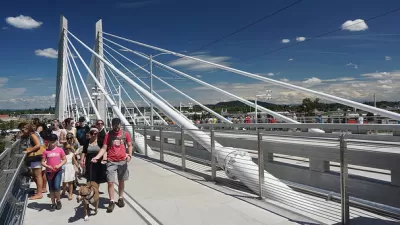As the largest council of governments in the country adopts a $525 billion transportation and land use plan for the next two decades, Josh Stephens marks the beginning of Southern California's age of climate-friendly, smart-growth regionalism.
This week, the 83 members of the Southern California Association of Governments' general assembly unanimously adopted the organization's 2012-2035 Regional Transportation Plan (RTP) and Sustainable Communities Strategy (SCS), "a roadmap to welcome four million new residents and 1.7 million new jobs into our region by 2035," noted Pam O'Connor, SCAG President.
The RTP/SCS is just the second in the state to be adopted under 2008's landmark climate change and smart growth law, Senate Bill 375, which sets targets for greenhouse gas reduction that each the state's Metropolitan Planning Organizations (MPOs) are mandated to meet through integrated long-range land use and transportation planning via sustainable community strategies.
As such, the ambitious and progressive plan "dedicates 54 percent of funding to transit and non-highway options, more than triples the funding for bike and pedestrian projects, and reduces traffic congestion overall and per-capita delay by 24%--despite the addition of 4 million residents in the 6-county region by 2035. It would locate 87 percent of all jobs and 82 percent of all housing within a half mile of rail stations and bus stops. Apartments and condominiums would account for 68 percent of all development, up from 39 percent in the previous plan," reports Stephens.
FULL STORY: Southern California Adopts $525 Billion Regional Plan

Planetizen Federal Action Tracker
A weekly monitor of how Trump’s orders and actions are impacting planners and planning in America.

Map: Where Senate Republicans Want to Sell Your Public Lands
For public land advocates, the Senate Republicans’ proposal to sell millions of acres of public land in the West is “the biggest fight of their careers.”

Restaurant Patios Were a Pandemic Win — Why Were They so Hard to Keep?
Social distancing requirements and changes in travel patterns prompted cities to pilot new uses for street and sidewalk space. Then it got complicated.

Platform Pilsner: Vancouver Transit Agency Releases... a Beer?
TransLink will receive a portion of every sale of the four-pack.

Toronto Weighs Cheaper Transit, Parking Hikes for Major Events
Special event rates would take effect during large festivals, sports games and concerts to ‘discourage driving, manage congestion and free up space for transit.”

Berlin to Consider Car-Free Zone Larger Than Manhattan
The area bound by the 22-mile Ringbahn would still allow 12 uses of a private automobile per year per person, and several other exemptions.
Urban Design for Planners 1: Software Tools
This six-course series explores essential urban design concepts using open source software and equips planners with the tools they need to participate fully in the urban design process.
Planning for Universal Design
Learn the tools for implementing Universal Design in planning regulations.
Heyer Gruel & Associates PA
JM Goldson LLC
Custer County Colorado
City of Camden Redevelopment Agency
City of Astoria
Transportation Research & Education Center (TREC) at Portland State University
Camden Redevelopment Agency
City of Claremont
Municipality of Princeton (NJ)





























